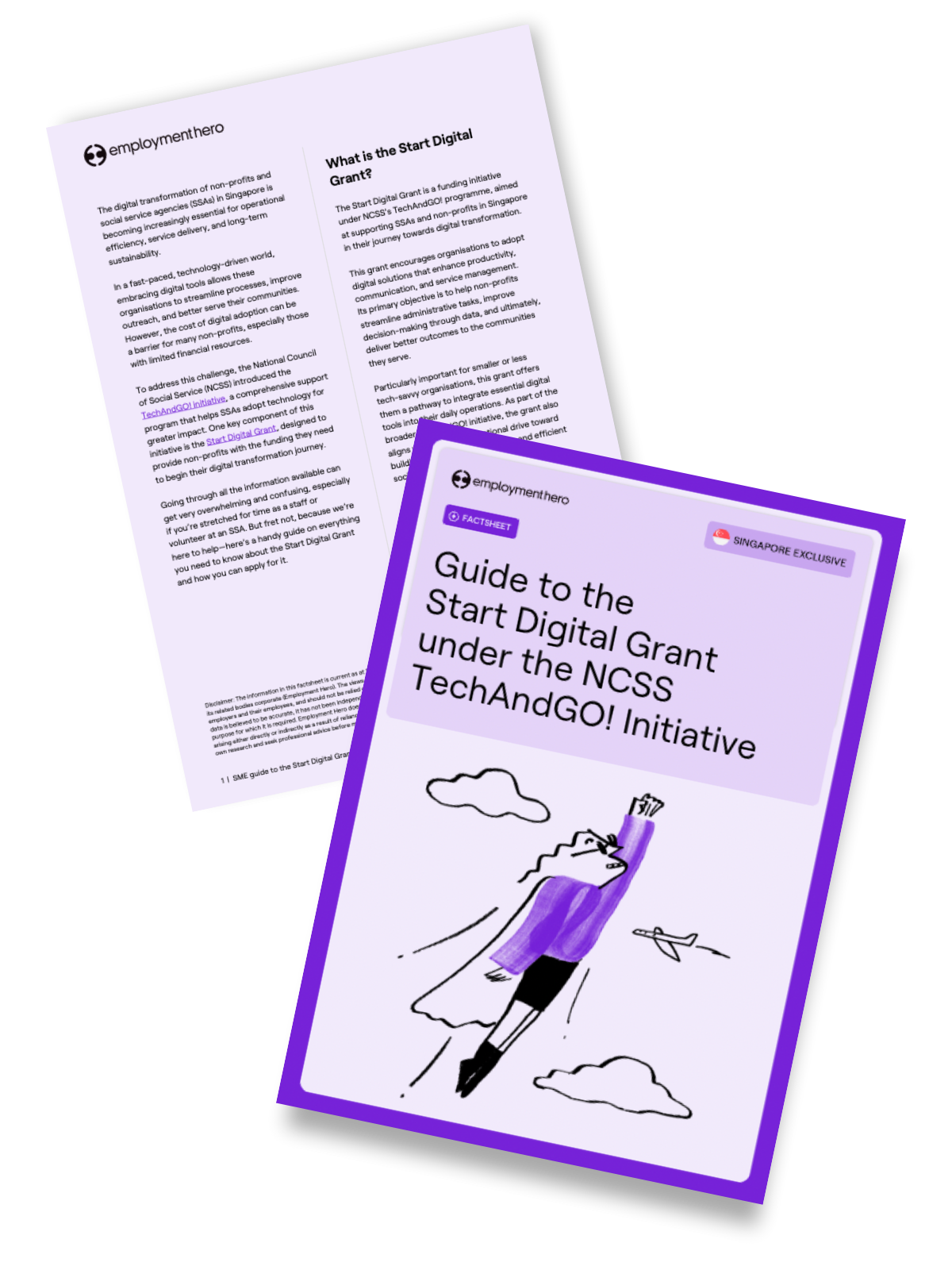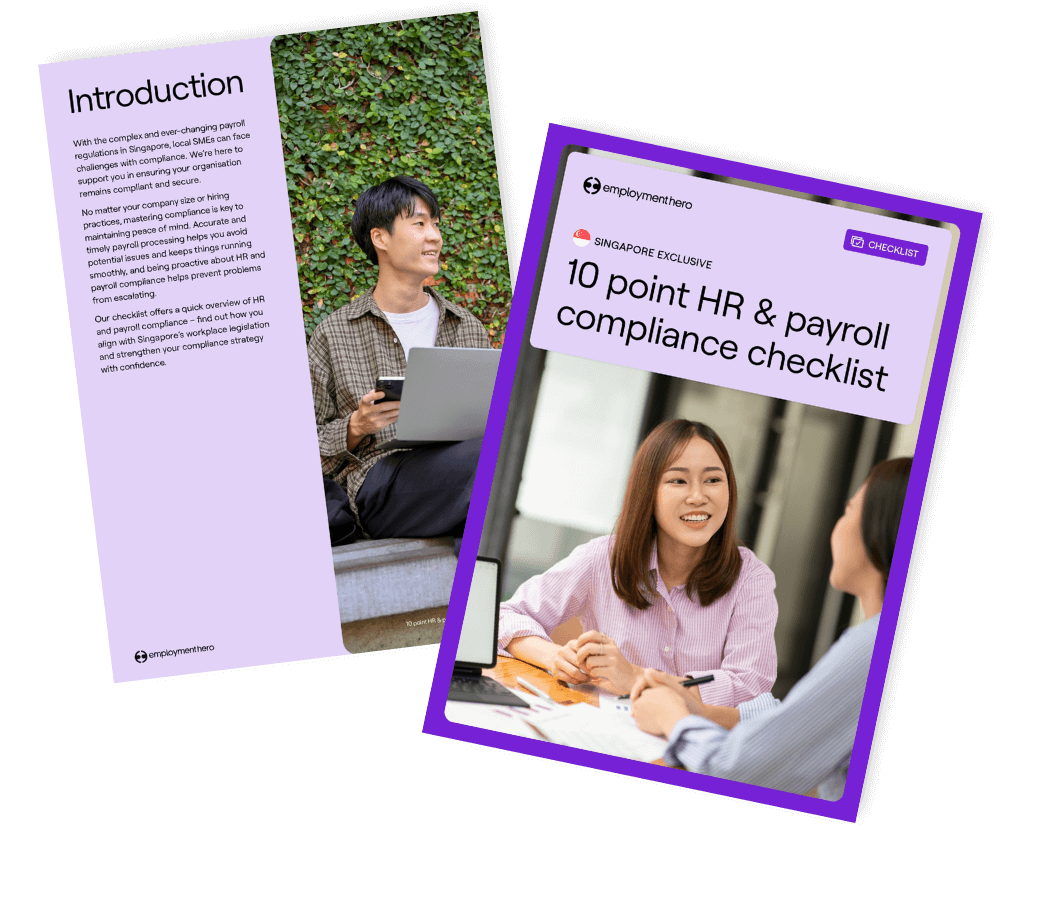Guide to Payroll in Singapore
Published
Guide to Payroll in Singapore
Payroll regulations are incredibly complex, and the reality is if you’re an employer and you get it wrong, there can be disastrous implications. With SMEs making up 99% of businesses in Singapore, they’re the backbone of the economy and yet are often left to figure things out by themselves.
With so much uncertainty in the economy, plus a constant struggle to retain and recruit employees, there’s never been a more important time for Singaporean businesses to make sure they’re paying their employees compliantly. Our Singapore payroll guide can help you do just that.
It covers;
- Salary and payments
- Yearly reporting
- Payslips and pay records
- When can non-compliance occur?
- Choosing the right payroll software in Singapore
Disclaimer: The information in this guide is current as at 27th March 2024, and has been prepared by Employment Hero Pty Ltd (ABN 11 160 047 709) and its related bodies corporate (Employment Hero). The views expressed in this guide are general information only, are provided in good faith to assist employers and their employees, and should not be relied on as professional advice. The Information is based on data supplied by third parties. While such data is believed to be accurate, it has not been independently verified and no warranties are given that it is complete, accurate, up to date or fit for the purpose for which it is required. Employment Hero does not accept responsibility for any inaccuracy in such data and is not liable for any loss or damages arising either directly or indirectly as a result of reliance on, use of or inability to use any information provided in this article. You should undertake your own research and to seek professional advice before making any decisions or relying on the information in this guide.
Who is responsible for income taxes in Singapore?
Unlike some other countries, employers do not withhold payroll tax for employees in Singapore. The employee is responsible for their own annual income tax declaration, which is paid directly to the local tax authority, the Inland Revenue Authority of Singapore (IRAS).
There are several variations that may apply to an employee’s personal income tax rate. For more information, visit the IRAS website.
Although monthly tax obligations are not withheld by the employer, there are important levies, deductions and contributions that are paid during the payroll process. Our payroll guide can help you better understand these payments.
What is the Singapore Employment Act?
In Singapore, salary payments, deductions and variable wages are governed by the Employment Act.
The Employment Act is Singapore’s primary piece of payroll legislation, and governs most of the country’s laws relating to paying employees.
All employees working under a contract of service are covered by the Act, and it applies to;
- Local and foreign employees
- People employed on a full-time, part-time, temporary or contract basis
- People who are paid hourly, daily, monthly or piece rate (they are employed based on volume of work or tasks completed)
It does not cover people employed as seafarers, domestic workers, statutory board employees or civil servants. The terms and conditions of their employment will be according to their employment contract instead.
Enacted in 1968, the Employment Act is Singapore’s main labour law and acts as a source of truth for all things related to employment in Singapore. It relates directly to payroll, and also to other HR compliance.
To learn more about HR compliance under the Employment Act, download our free Guide to HR Compliance in Singapore.

Why is it important for business owners to understand payroll?
If you employ people, then payroll is a key part of your business – regardless of whether you’re outsourcing payroll or processing it in-house. It’s a key outgoing expense, it’s what connects your team to their jobs and it’s a constant business operation.
Very few people become employers to become payroll experts, but having a strong understanding of the practice can be extremely beneficial when it comes to running your business. Here’s why you should feel empowered to learn more about payroll.
Business compliance
Whether it’s paying your employees the correct amount in the right salary period, keeping track of overtime pay or paying the correct amount in contributions to the Central Provident Fund (CPF), understanding payroll and employment income can help you stay compliant.
Whether you employ one person, or one hundred people, the same rule applies to all businesses when it comes to payroll – be compliant or face strict penalties. Remember, it doesn’t pay to take risks. Investing your time in understanding the practice will help safeguard your business.
Employee engagement
When we think about employee engagement, we often focus on company culture and employee perks and benefits.
What we often forget is that one of the best ways to engage your employees is to run payroll correctly and on time, each salary period. When you have a great understanding of payroll processing, you can make sure this process is being completed correctly – and you can easily manage any employee enquiries if an issue were to arise.
By having the knowledge and the overview of your payroll process, you send a message to your employees that you care about their experience within the business – and you understand that their salary payment is an important part of their life.
Examples of contributions and levies
Let’s walk through a brief overview of contributions and levies. You can find a more detailed explanation of these by downloading the Payroll Guide.
Central Provident Fund contributions
The Central Provident Fund, commonly known as CPF, is a government-run social security fund that supports retirement, healthcare and housing. It is funded by contributions from employers and employees. Payments to CPF are known as CPF contributions.
Singaporean citizens and Singapore permanent residents are entitled to CPF contributions from their employer.
Employers are required to make two contributions to an employees’ CPF account every month:
- Employee’s contribution: deducted from their salary; and
- Employer’s contribution: a fixed percentage of the employee’s wage, provided on top of their existing salary.
If your employee is earning more than $500 per month, you’re permitted to deduct the employee’s share of mandatory CPF contributions from their wages — but rates will be lower for those earning between $500 to $750. The CPF contribution rates are not fixed for everyone — they are dependent on an employee’s age, and their permanent resident status (if applicable).
The Foreign Worker Levy
The Foreign Worker Levy (sometimes referred to as the Foreign Workers Levy or the FWL) is defined by the government as ‘a pricing mechanism to regulate the number of foreigners in Singapore.’ A business must pay the monthly levy for every worker on a Work Permit or Temporary Work Permit.
The Skill Development Levy
The Skill Development Levy, or SDL, is another compulsory contribution you have to pay for all your employees, including foreign employees, working in Singapore. The funds contributed are delivered into the Skills Development Fund, which according to CPF, “is used to support workforce upgrading programmes and to provide training grants to you when you send your employees for training under the National Continuing Education Training system.”
Self Help Group contributions
Self Help Group funds (SHGs) support low income groups and the less privileged in different communities in Singapore.
SHARE donations
SHARE donations are not mandatory contributions. SHARE donations are deducted from the employee’s wages, and collected by the CPF board on behalf of the Community Chest, which finances a variety of programs including those designed for at-risk youth, mental health sufferers, adults with disabilities and more.
Examples of common payroll mistakes
Inadequate record keeping
Still using old school pieces of paper to log your employees’ payroll documentation? As it’s so easy for paper to be misplaced or incorrectly filed, this could leave you open to liability if you were to be audited.
In today’s digital age, record keeping is easy. With so many software options available to help manage payroll, payslips, timesheets and your employees’ time and attendance, there’s no excuse for not having the correct records of your employees.
Incorrect set up of your payroll system
As you can see above, there are plenty of contributions and levies to keep track of when processing payroll. Apart from paying an employee’s basic salary correctly, you want to make sure that all payments are set up properly and going to the correct place.
Imagine if you’ve been paying a team $2 less of their correct CPF contribution amounts for the last five years? Think about how much you’d be required to pay back, and the additional penalties that may apply.
Forgetting about the employee experience
Employees want to be informed about their pay just as much as you do. If you aren’t providing them with quick access to their payslips, it can be incredibly frustrating.
Payslips are essential records that you are obligated to provide to your employees, but don’t make them wait for a paper document or email each salary period. Giving them access to cloud-based payslips (like those on Employment Hero), can help them feel empowered to review their income information anytime, anywhere.

How can payroll software help?
Payroll software can make a significant difference when it comes to processing an employee’s salary.
Fully integrated with the IRAS, pay your people faster than ever with automated payroll from Employment Hero. Instantly calculate contributions, generate accurate data and take care of workforce planning — all in one central place. Here are just a few of the helpful features on the platform.
Automated payroll
In a few simple clicks, you can process, finalise and publish your payroll using the power of automation. Employment Hero Payroll can quickly make accurate calculations, including deductions and CPF contributions. Information appears for the administrator during the pay run, clearly displaying the calculations and giving you full transparency over the process.
Time and attendance
Keeping track of your employees’ hours is important when you’re running your business; especially if your team members are not on a full-time salary. Payroll software can help with everything from dynamic rostering to cover peak business times, shift bidding, clocking in and out remotely using the app and much more. Easily approve timesheets and accurately process all time worked.
Record keeping and reports
When you use payroll software, digital records are instantly created for each employee’s payslip. Never lose a payslip again, and quickly access documents in our easy-to-use system. This can help you cut down hours of admin, as you quickly locate essential documents.
When you use Employment Hero payroll, you can also lodge income data electronically via the Auto-Inclusion Scheme and generate accurate reports every time with our powerful tools.
Staying up to date
Understanding and complying with the Employment Act can be one of the biggest challenges facing small to medium businesses, but that’s where software can help. We have calculations of pay rates and deductions built-in, so you never have to manually calculate this.
Our experts also keep up to date with changes to legislation and automatically update the platform when they’re introduced.
Employment Hero can give you the compliance confidence you need. We’re employment law and payroll experts who are obsessed with keeping up to date with the latest legislation, and we’re trusted by over 300,000 business globally.
Eager to learn more about payroll software? Book a demo with one of our business specialists now.
Related Resources
-
 Read more: Everything You Need to Know About the Start Digital Grant Under the NCSS TechAndGO! Initiative
Read more: Everything You Need to Know About the Start Digital Grant Under the NCSS TechAndGO! InitiativeEverything You Need to Know About the Start Digital Grant Under the NCSS TechAndGO! Initiative
Discover the Start Digital Grant under NCSS’s TechAndGO! initiative.
-
 Read more: 10 point HR and payroll compliance checklist
Read more: 10 point HR and payroll compliance checklist10 point HR and payroll compliance checklist
Get peace of mind with our 10 point HR and payroll compliance checklist.
-
 Read more: From Hi to Hired: Hire Faster, Hire Smarter.
Read more: From Hi to Hired: Hire Faster, Hire Smarter.From Hi to Hired: Hire Faster, Hire Smarter.
This session will equip you with techniques to streamline hiring, enhance candidate experience.







